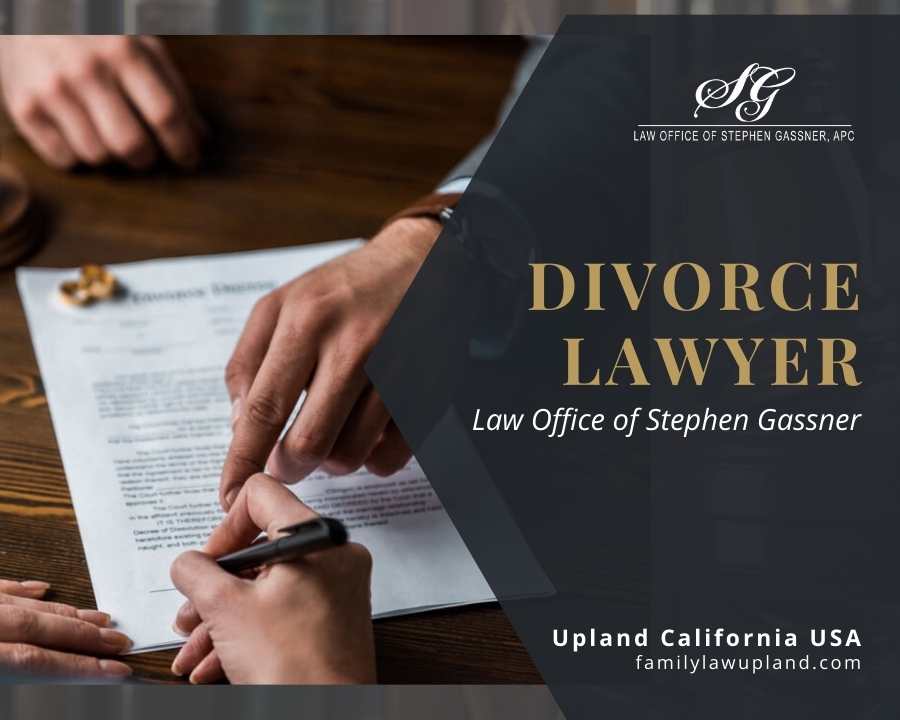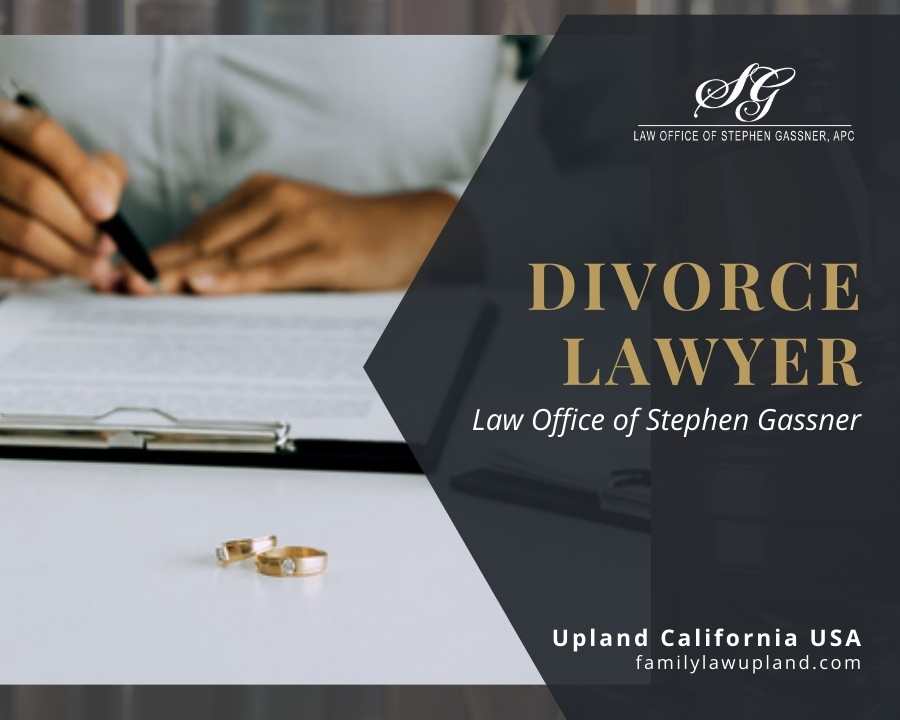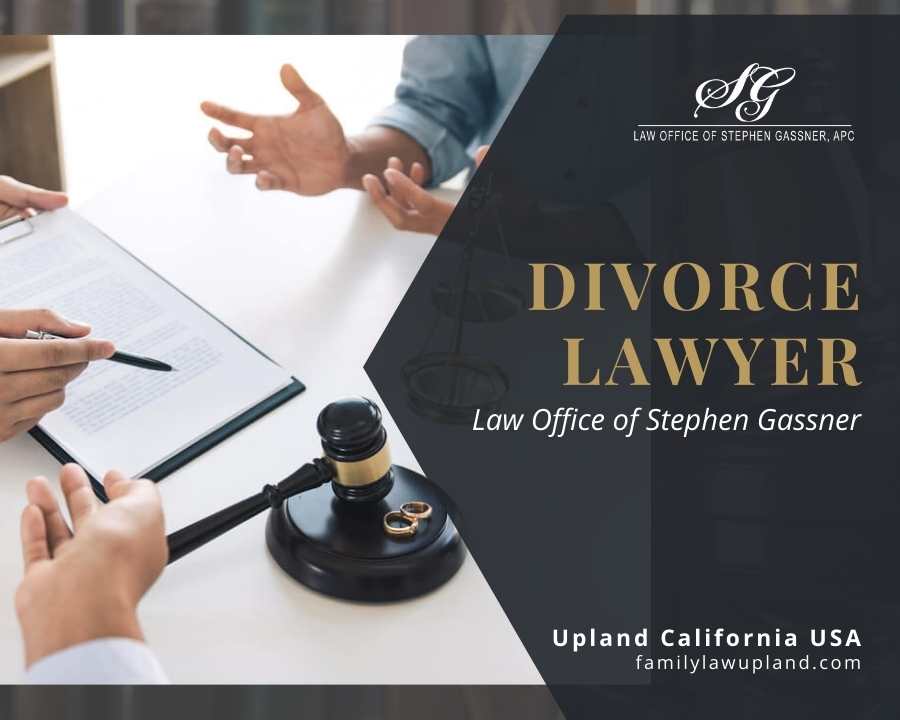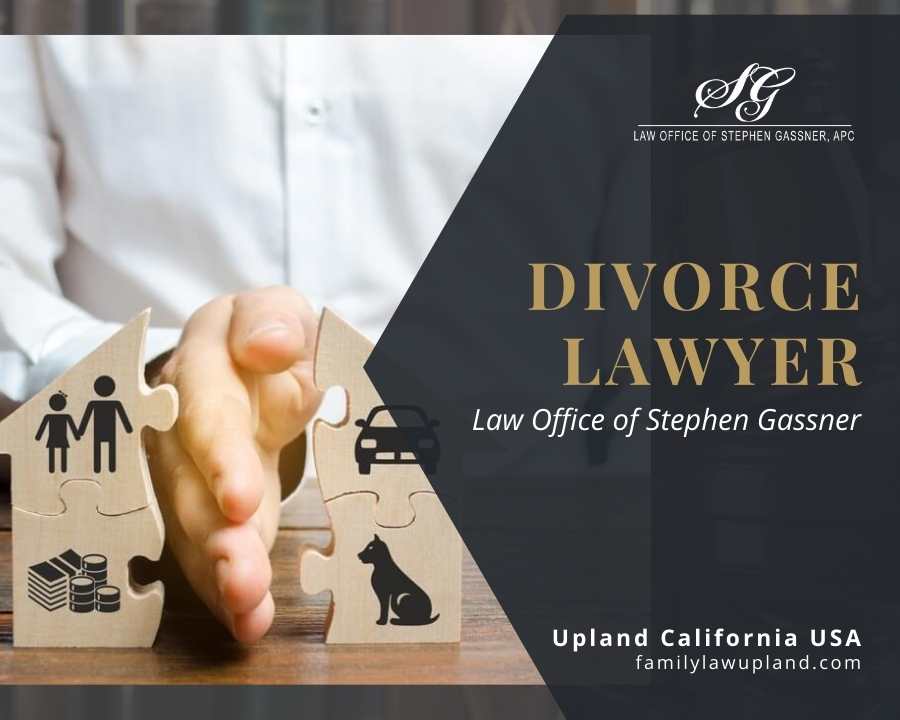Divorce - The Law Office of Stephen Gassner
Table of Contents
Toggle
Even though separation and divorce are emotionally taxing processes, it is possible to end a relationship in a less stressful manner. Anger, grief, anxiety, and fear are common feelings released during the breakdown of a marriage. The last thing you want to do is sit down and talk to your soon-to-be ex-spouse, but cooperation and communication make divorce better for both parties. Although you don’t need a lawyer to get divorced, the procedure is legally complex. Doing it alone might be problematic, especially if a lawyer represents the other spouse. Divorce Lawyer Upland CA USA
The Law Office of Stephen Gassner divorce lawyer handles the divorce’s relevant custody and financial issues while defending the client’s rights. We carefully explain the law and your legal choices. The complexity of the legal divorce procedure, which includes a lot of paperwork, waiting periods, and form-filling requirements, makes it more difficult for people who want to get a divorce without a lawyer. Whether a couple has children, property, or sizable retirement funds will depend on their situation and whether they require lawyers to be heavily involved in their divorce. Let the Law Office of Stephen Gassner divorce lawyer assist you with a fair divorce and maintain a cordial connection with your family and children.
What is Divorce?
Divorce is the legal dissolution of a marriage, typically allowing the former spouses to remarry. Divorce may be challenging and uncommon in areas where traditional religious authority still reigns, particularly when, as it does for Roman Catholics and Hindus, the religious tradition considers marriage irrevocably bound.
An agreement with your spouse is the fundamental objective of divorce. A Marital Settlement Agreement serves as a written record of the agreement’s terms. The Property Settlement Agreement is another name for this document. Most divorce cases, or a very high percentage, are settled. In most states, divorces are handled by state courts, while some states allow couples to file for divorce in family courts. Divorces are typically initiated by one party filing the divorce paperwork. If both parties agree, they can jointly file for divorce.

Main Types of Divorce
In California, there are three main types of divorces:
1. Legal Separation
A legal separation occurs when a couple separates without getting divorced. They continue living together and do not change their marital status. However, they cannot remarry each other. Only after being apart for at least 366 days may you petition for divorce, often known as an “absolute divorce.”2. Decree of Nullity
A decree of nullity is granted when the court finds the marriage invalid because it never existed. For example, if a person married someone underage, the marriage could be declared void.3. Annulment
An annulment is used to end a valid marriage performed in another jurisdiction.The legal process of ending a marriage varies depending on whether you want to separate or divorce. Consult a lawyer if you think you might be facing a divorce.Contested Divorce vs. Uncontested Divorce
In California, which is known as a “no-fault divorce” state, neither spouse is required to apply for divorce based on a particular fault or reason. Instead, irreconcilable disagreements must be the reason for the divorce.
An uncontested divorce is one in which both parties agree on all matters pertaining to it (such as alimony, property division, child custody, child support, etc.). A divorce is contested if the couple can’t agree on at least one important issue.
What to Expect in the Divorce Process
Divorce is challenging and traumatic, regardless of the circumstances. After all, you face emotional and financial difficulties and a tough legal procedure. Even though no two divorce cases are identical, most follow this procedure:
1. File the Divorce Papers
The divorce process begins with a divorce petition. Whether or not the other spouse agrees to the divorce, one spouse—the petitioner—must file a formal petition with the court asking the court to dissolve the marriage. A filing fee is required to be paid by both parties. The petition has to contain the following:
-
A declaration that at least one spouse satisfies the state’s residency requirements for divorce
States typically demand that at least one spouse reside there for a time period of three to twelve months as well as for a minimum of ten days to six months in the county where the petition is filed. The spouses must first satisfy the state’s residency criteria before the court accepts the case.
-
A valid cause of divorce
Whether you file an at-fault or no-fault divorce differs by state. Adultery, abandonment, impotence, infertility, criminal record, emotional or physical abuse, substance misuse, and mental disease are the grounds for blame. No-fault reasons include irreconcilable differences, incompatibility, and irretrievable breakdowns.

2. Apply for Temporary Judicial Orders
Courts are aware that in some cases, such as when a stay-at-home parent is raising the children and financially reliant on their spouse, waiting months for a court to rule on a divorce is not practicable. Therefore, when you file for parental divorce, you can petition the court for temporary orders relating to child custody, child support, and spousal maintenance.
The court will hold a hearing after you ask for a temporary order, hear both spouses’ testimony, and then make a decision. Usually, the judge moves swiftly to make the temporary order, which is in effect until the divorce is fully finalized or the court makes another decision.
3. Submit the Proof of Service
When you file for divorce and ask the court for temporary orders, you must provide your spouse with a copy of the documents and submit proof of service to the court. You can use this document to show the judge that you followed the procedures for “serving” a copy of the divorce petition on your spouse. If you fail to serve your spouse correctly and provide the certificate of service, the judge cannot move on with your divorce case.
If your spouse is agreeable to the divorce and willing to sign an acknowledgment of service, this step may be simple. But, if your spouse opposes the divorce or attempts to make the process more difficult for you, serving the papers can be challenging. In these situations, it’s advisable to work with a qualified expert who delivers documents to challenging parties.
Your spouse, the respondent, has a certain amount of time after receiving the paperwork to file a response to the divorce petition. A “default” decision, which can be challenging and expensive to overturn, could result from not responding promptly. The respondent may contest the charges in the petition, the basis for an at-fault divorce, and the determinations involving child custody, property division, spousal support, and similar matters.

4. Enter into Settlement Talks
You will need to negotiate a settlement if you and your soon-to-be ex-spouse cannot agree on custody, support, and property division. You, your spouse, and your attorney(s) may attend a settlement conference that the court arranges to discuss your case. In addition, the court will occasionally set up mediation sessions with an impartial mediator to help settle any outstanding difficulties. Even though it is not needed in all jurisdictions, mediation can be a helpful tool to reduce stress, costs, and time spent on the divorce process. The courthouse in the county where the divorce occurred is where all divorce records are kept. They are public records that anybody may access. They are stored at the courthouse’s records office and occasionally in another county’s records office.
5. If Necessary, Go to Trial
The court must step in if negotiations fail, necessitating a divorce trial. A trial is typically conducted before a judge, though in some circumstances, it may be performed before a jury. In any scenario, the arguments for child custody, monetary support, property partition, and other divorce-related issues are supported by facts and testimony from both sides.The court weighs all the testimony and evidence before making a final and binding ruling. Remember that divorce cases are costly, time-consuming, and require much planning. Therefore, investigating alternative dispute resolution methods, such as mediation, collaborative divorce, or private arbitration, is usually worthwhile.
6. Finalize the Judgment
Whether the divorce was peaceful or necessitated a trial, the process is concluded when the judge signs the divorce decree. This legal document serves as the divorce court’s final ruling. It dissolves the marriage and details the distribution of assets and debts, child and spousal support, and custodial and parenting time responsibilities. It is also known as an order of dissolution. The lawyer for the spouse who filed the lawsuit often drafts the judgment if you and your soon-to-be ex-spouse agree on a settlement. But the court will make the final decision if the divorce goes to trial.
What Sets Apart Separate Property From Marital Property?
Everything that either partner earned or gained during the marriage falls under the general definition of marital property. Separate property, on the other hand, solely belongs to one spouse. State laws differ, but separate property typically includes:
- Property that one or both spouses owned before getting married or following a formal separation
- Property is considered separate if it was acquired during a marriage in one spouse’s name and was not used to the other spouse’s advantage.
- Gifts or inheritances that one spouse has gotten throughout the marriage
- Accumulated pension benefits before marriage
- Specific awards for personal injuries
Learn More About: Mediation Attorney – Law Office of Stephen Gassner
Mediation
What Sets Common Law Property Apart from Community Property?
In a marriage, the property is regarded as marital or separate; nonetheless, the state’s property ownership structure decides who receives what in a divorce. Community property and equitable distribution, sometimes known as common law, are the two systems. California is included among the community property states. This means all debts and assets accumulated during a marriage are considered joint property and are shared equally in the event of a divorce. In other states, the common law system of property ownership is in place. These states divide marital assets and income “fairly,” though occasionally not equally.
Frequently Asked Questions
-
What is the Wife Entitled to in a Divorce in California?
In California, a wife may be entitled to payments for child support, spousal support, and primary custody up to 50% of the marital estate and up to 40% of their partner’s income. -
Is it Always 50-50 in Divorce in California?
The community property laws and the 50/50 split are the default guidelines for a California divorce. However, that does not imply that the parties must follow those guidelines. For example, before getting married, parties might agree to a prenuptial agreement that specifies what assets and income belong to who. -
How Long Does it Take to Get a Divorce in California if Both Parties Agree?
Even if both parties consent to the split right away, the entire divorce procedure in California might take at least six months. Due to California’s divorce laws and the six-month waiting period, this period of time is necessary.
Your Trusted Divorce Lawyer
At the Law Office of Stephen Gassner divorce lawyer , we assist divorcing couples in defending their legal interests and building better lives for themselves after divorce. Numerous individuals from various walks of life have been represented by us and supported throughout their legal actions. We provide the role of an unbiased third party, helping clients maintain composure and working for the best outcome possible, which is crucial given the emotionally charged nature of divorce processes. To know more about what we can provide you, call us now for an appointment!
Looking for a Family Law Attorney in California, USA? Look no further the Law Office of Stephen Gassner can help you with different family law issues, including divorce, property division, paternity, child custody and support, spousal support, visitation rights, and property division including the complex division of business property. We serve in the following areas of California, USA.
Family Law in Chino Hills, CA
Family Law Claremont, CA
Family Law in Eastvale, CA
Family Law in Fontana, CA
Family Law in Ontario, CA
Family Law in Rancho Cucamonga, CA
Family Law in Upland, CA
Need Legal Advice on Divorce Lawyer?
Or contact the Law Office of Stephen Gassner Divorce Lawyer for your inquiries
At (909) 937-7000 Now!
324 N Mountain Ave, Upland, CA 91786, United States
(909) 937-7000

